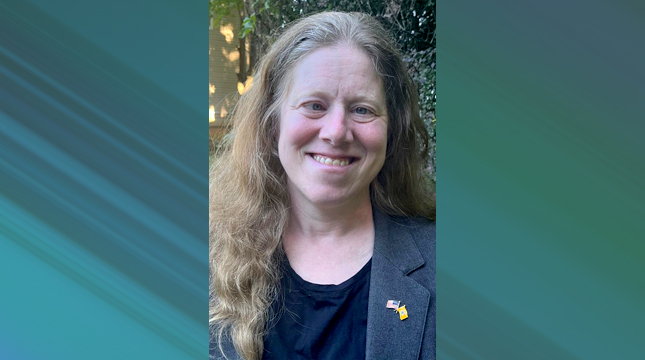
Growing up as a child with a disability, Professor Cynthia Simon experienced what is now called bullying. From political science to law to advocacy, she is teaching students that much of what disables are not impairments, but attitudes and societally created barriers.
“All I wanted, and still want, is an equal opportunity.”
Growing up as a child with a disability, Cynthia Simon experienced what is now called bullying. She was told she was not able to or denied the opportunity to do things she wanted because of her disability.
Professor Simon, who is teaching Disability Policy and Law, the inaugural course for the Bloustein School’s new Disability Studies minor, is an optic albino and legally blind. Her condition includes light sensitivity, limited depth perception, and less peripheral vision than a typical person. She is unable to drive, it takes her longer to read things, and she needs to be very close to see any kind of detail.
A separate disability she has is face blindness, a condition people with perfect vision can also experience. She does not recognize faces at all, including herself in a picture.
Proving that her disabilities would not hinder her, she earned a BA from Rutgers and an MA from Eagleton Institute of Politics, as well as a JD from New York University. At one point she returned for a Ph.D. in political science, completing all coursework except for her dissertation, choosing instead to focus on teaching and advocacy.
“I teach to empower and have been doing so for 27 years,” Simon explains. “Studying the Civil Rights movement in middle school inspired me to become politically active, study law, and eventually become a professor so that I could not only gain equal opportunity for myself, but for all, and so I could teach others how to advocate and participate effectively in our democracy.”
A wife and mother, Simon also represented the United States as a visually impaired judo player in the 2012 Paralympic Games. She enjoys board games and puzzles, particularly those involving numbers, such as Sudoku and KenKen.
Many of the challenges people with disabilities face are the result of negative attitudes and barriers created by society, not the actual impairments people with disabilities have. Eliminating these barriers requires those without disabilities to respect and listen to the voices of those with disabilities.
After graduating from one of the top law schools in the country, Simon was unable to find a job because of discrimination due to being legally blind and limited options because she does not drive. She opened her own law practice and has advocated on issues ranging from disability rights to student debt for almost 30 years. Around the same time, she began her teaching career at William Paterson as an adjunct faculty member.
“I began working on political campaigns in college and managed a few local ones, and also ran for office myself. I also served nine years as an elected school board member.”
Several years ago, Simon came across what she called a “sufficiently vague” ad for part-time lecturers needed in political science at Rutgers.
“I reached out to Distinguished Professor Milton Huemann, whom I knew from my undergraduate days, to inquire about the position and online options,” she said. “It’s a 45-minute drive to Rutgers from where I live, but as a visually impaired person it is more than a six-hour round trip with multiple transfers on public transportation.”
Simon was thrilled to find out her timing was perfect. Rutgers was just beginning to develop the Disability Studies minor. She developed and began teaching Disability Politics for the Political Science department. “I am fortunate to now be teaching the minor’s inaugural course, Disability Policy and Law.”
The fully online course takes an in-depth look at federal and state disability rights laws and their implementation as well as Social Security and Medicare/Medicaid policies related to people with disabilities. Simon’s overall purpose is to provide students with an understanding of what these acts require, the successes and challenges to implementation, and how they all interact.
Understanding the lived experiences of people with disabilities is key to impacting law and policy and being able to evaluate and propose changes to it.
“My lived experiences have made me want to do something to make things better. As a professor, I really encourage my students to share their experiences, as well,” she says. “My classes have a project where they interview people who are impacted by, or advocating in, the disability policy space. In their final project, students are asked to present a proposal for change to make things better.”
The Disability Studies minor is an acknowledgment of a significant part of humanity that is often overlooked or objectified, she explained. Simon believes the curriculum is especially important for those pursuing careers where they will be working with people with disabilities or for those looking to get involved in policymaking since all policies, not just those directly related to disability, impact our community.
Simon is hopeful that the minor will provide a place for students with disabilities to better understand who they are as individuals and their place in society.
“More importantly, I hope that students will be able to experience that ‘Aha!’ moment when they realize people are more than their disabilities. And, that our voices should be included in all that impacts us because much of what disables is not impairments but attitudes and societally-created barriers.”
Visit our website for more information about the Disability Studies minor.
